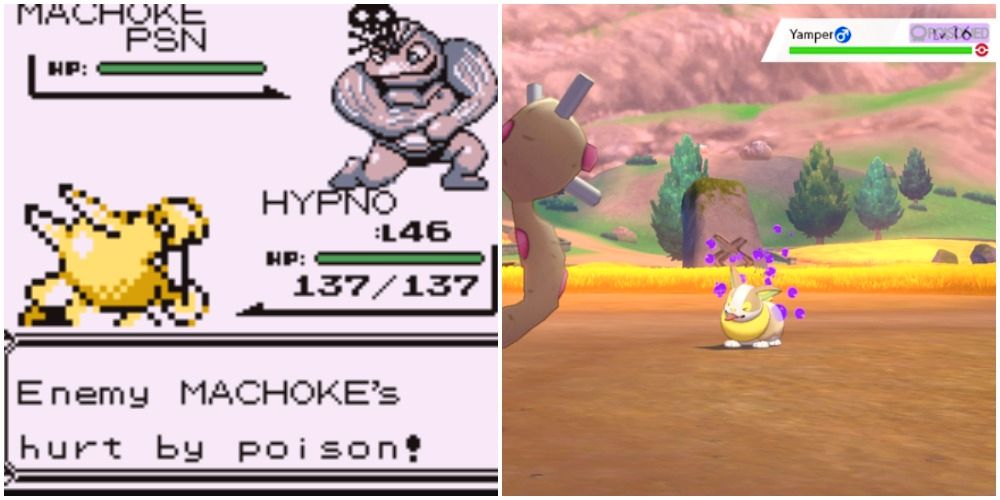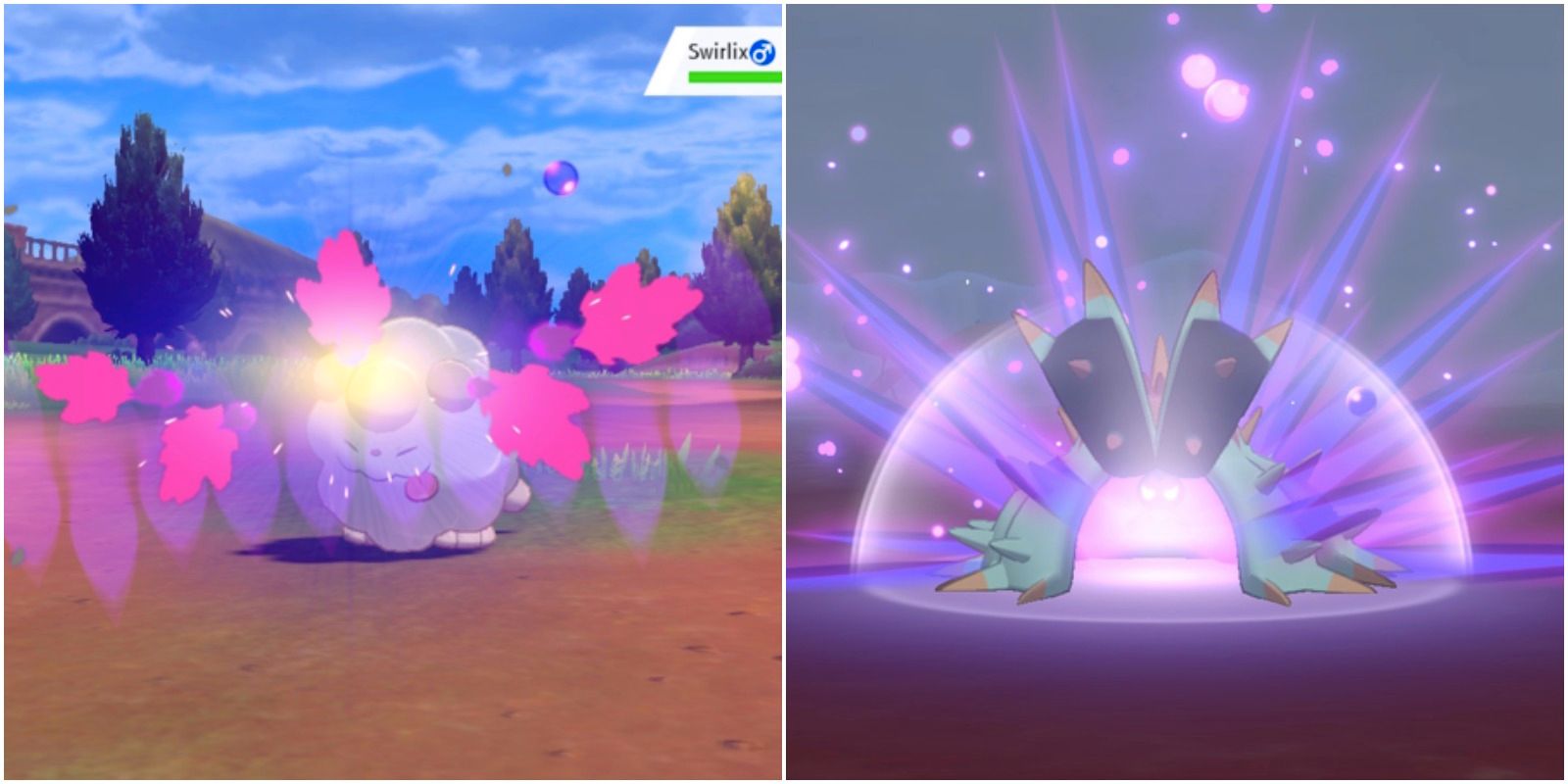Quick Links
- Poison Throughout The Generations Of The Main Series Pokemon Games
- Moves That Can Cause Poison & Bad Poison In Main Series Pokemon Games
Since the inception of the Pokemon franchise, up to its modern presence through Pokemon Sword & Shield, Poison has been a tactic both used and abused. One of the most common ways to damage enemies over time, almost any pokemon can learn a move that inflicts this status condition, making it one of the most offensively versatile.
RELATED: Pokemon: How Damage Is Calculated
Many players enjoying Pokemon Sword & Shield are familiar with Poison-related strategies, as moves like Toxic on defensive enemy builds can be seen frequently both in the base game and in online battles. As such, it would be useful to know the ins and outs of this status condition to better avoid it...or even to use it to one's advantage.
Poison Throughout The Generations Of The Main Series Pokemon Games

Poison In Generation 1 Pokemon Games
There are two types of Poison in the Pokemon games: regular Poison and Bad Poison. The first kind will reduce an afflicted pokemon's HP by 1/16th of its maximum value every turn (unless the poisoned pokemon knocks out an opponent, in which case the damage step of Poison gets skipped).
Bad Poison will begin by hurting the afflicted pokemon by the same amount as Poison, however, on every subsequent turn, the amount of HP lost will increase by 1/16th of that pokemon's max HP unless the badly poisoned pokemon is switched out or if the move Haze is used. If a pokemon that was badly poisoned was switched out and switches back into battle (or is hit by Haze), they will be afflicted by regular Poison instead of Bad Poison.
Outside of battle, pokemon that are poisoned will lose 1 HP every time that the player moves 4 tiles until they faint, which can cause a player to blackout if their last conscious pokemon faints this way.
Interestingly, the game's coding uses the same value for Bad Poison as it does for Leech Seed, though, both can be applied to the same target, which means that players can use moves that apply Bad Poison (Toxic) with Leech Seed to multiple the effects to essentially take down any foe in 4 to 5 turns purely with damage over time effects.
Poison In Generation 2 Pokemon Games
A pokemon afflicted by regular Poison will now lose a value of HP every turn equal to 1/8th of its max HP. Bad Poison no longer uses the same value as Leech Seed or other damage over time effects and Haze no longer changes Bad Poison to regular Poison.
As a result of a slight programming oversight, Steel-types that cannot normally be poisoned due to their natural immunity to Poison-type moves can actually be afflicted with the Poison status condition if they are subjected to the secondary effects of the Bug-type move Twineedle.
RELATED: Pokemon: The Strongest Poison-Type Move of Each Generation, Ranked
Poison In Generation 3 Pokemon Games
This generation saw many fixes to the issues plaguing the usage of this status condition in the past. Firstly, if a poisoned pokemon knocks out a foe, they will now take Poison damage. Next, Bad Poison remains Bad Poison on an afflicted pokemon even if they are switched out and back into battle, though the counter will be reset. Finally, Twineedle can no longer Poison Steel-types, much to the disappointment of Beedrill fans.
Poison In Generation 4 Pokemon Games
The only change made in this generation is that pokemon outside of battle who are poisoned will no longer faint from the residual poison damage that occurs every 4 steps. Instead, when they get down to 1 HP, they will be cured of Poison automatically.
Poison In Generation 5 Pokemon Games
Pokemon that were badly poisoned in battle become regularly poisoned after the battle ends. Furthermore, pokemon no longer take Poison damage outside of battle.
Poison In Generation 6 Pokemon Games
There were no changes made to Poison or Bad Poison between the Generation 5 and Generation 6 Pokemon games.
Poison In Generation 7 Pokemon Games
Pokemon with the ability Corrosion (exclusive to Salandit and Salazzle) can inflict Poison or Bad Poison on Steel or Poison-type pokemon.
Poison In Generation 8 Pokemon Games
In a Max Raid Battle, if a Dynamaxed or Giagantamaxed pokemon becomes badly poisoned, it will automatically become regularly poisoned immediately.
Moves That Can Cause Poison & Bad Poison In Main Series Pokemon Games

| Move Name | What Kind Of Poison It Inflicts | Probability Of Causing Poison | Description |
| Baneful Bunker | Poison | 100% | Only inflicts Poison on foes who make contact with the user after using this move (on the same turn) |
| Fling | Poison or Bad Poison | 100% | Will inflict Poison on foes if the user is holding the Poison Barb item or will inflict Bad Poison if the user is holding the Toxic Orb item |
| G-Max Malodor | Poison | 100% | Exclusive G-Max move of Gigantamax Garbodor |
| Poison Gas | Poison | 100% | A regular status move |
| Poison Powder | Poison | 100% | Cannot affect pokemon with the ability Overcoat, those holding the Safety Goggles item, or Grass-types |
| Psycho Shift | Poison or Bad Poison | 100% | Can only inflict Poison or Bad Poison if the user is poisoned or badly poisoned respectively |
| Toxic Spikes | Poison or Bad Poison | 100% | If this move is used once, foes who enter battle will be poisoned, while, if used twice, foes who enter battle will be badly poisoned |
| Toxic Thread | Poison | 100% | A regular status move |
| Toxic | Bad Poison | 100% | Despite having 90% Accuracy, this move will never miss if used by Poison-type pokemon in Generation 4 to Generation 8 games |
| Poison Fang | Bad Poison | 50% | From Generation 3 to Generation 5, this move had a 30% chance to inflict Bad Poison |
| G-Max Stun Shock | Poison | 50% | Exclusive G-Max move of Gigantamax Toxtricity |
| Smog | Poison | 40% | A damage-dealing special move |
| G-Max Befuddle | Poison | 33.3% | Exclusive G-Max move of Gigantamax Butterfree |
| Gunk Shot | Poison | 30% | A damage-dealing physical move |
| Poison Jab | Poison | 30% | A damage-dealing physical move |
| Poison Sting | Poison | 30% | A damage-dealing physical move |
| Secret Power | Poison | 30% | Only has a chance to cause Poison if used while in tall grass (only in Generation 3 games) |
| Sludge | Poison | 30% | A damage-dealing special move |
| Sludge Bomb | Poison | 30% | A damage-dealing special move |
| Shell Side Arm | Poison | 20% | A damage-dealing special move |
| Twineedle | Poison | 20% | This move is divided into 2 separate hits, each with its own chance to inflict Poison |
| Cross Poison | Poison | 10% | A damage-dealing physical move |
| Poison Tail | Poison | 10% | A damage-dealing physical move |
| Sludge Wave | Poison | 10% | A damage-dealing special move |
MORE: Pokemon Sword & Shield: The Strongest Poison Pokemon, Ranked

